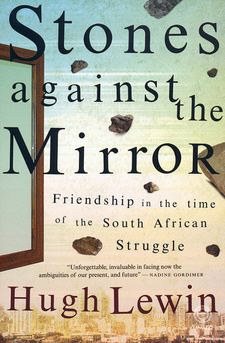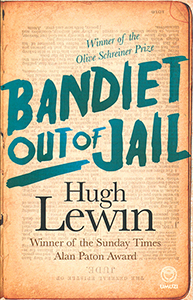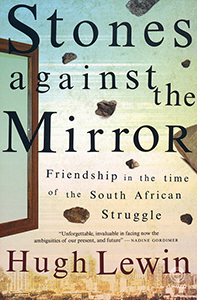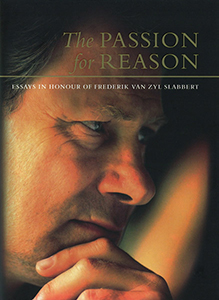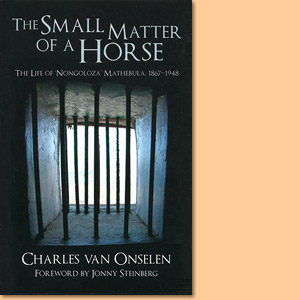Stones against the Mirror, by Hugh Lewin
A brave and moving memoir which is both a family history and a story of friendship and betrayal between people caught up in the wrenching forces of the South African Struggle. Stones against the Mirro is unforgettable, invaluable in facing now the ambiguities of our present, and future.
This is the book that was waiting to be written. There have been many accounts of life in the active struggle against the apartheid regime but this one is a fearless exploration into the deepest ground - the personal moral ambiguity of betrayal under brutal interrogation - actual betrayal of the writer by the most trusted associate and closest friend; and the lifetime question of whether one would have betrayed that same friend under such circumstances, oneself. Hugh Lewin is the man to have faced this. Nadine GordimerA friend: My closest friend was Adrian. We met as students. We never lived in the same town but we worked together as activists, then as under-grounders, through four, maybe five precarious years. I grew to think of him as my twin brother. That was more than forty years ago. My dearest friend, he said of me. Like twins, I said. But that was before my trial - and the bomb at Park Station, Johannesburg. On a wintry July day in 1964, Adrian was detained by the security police in Cape Town. Five days later they picked me up in Johannesburg. He had given my name. A couple of months later he was a state witness in the trial that sent me to prison for seven years for anti-apartheid sabotage. We were both twenty-five years old. Now I'm arriving at another railway station, in another country. I have travelled a whole lifetime of not wanting to meet Adrian again. Convinced that we never would. Never could. But that's what I've been writing about. Trying to describe where we came from, how we got involved. And it's because of the writing - bumping into him again, as it were - that I have asked him if we can meet. He has agreed. So here I am, on the express train from London, arriving soon in York. I'm still not sure that I can go through with it. I've seen a recent photograph of him, with the same enigmatic smile, but will we recognise each other? I've prepared a long list of questions, but will I ask them? The train's beginning to slow down. It's a long way from Park Station.
Stations: Railway stations are meeting points of loss and delight. I discovered this as a student when the authorities withdrew my passport. I would travel to the station with a carload of friends and watch them as they passed easily on their way to away. I would feel in my empty pocket, where there was no passport. Or watch, as the train slowed its way into the platform, then burst its side with shouts and clamourings, spilling out friends and suitcases from across the border, from places you can reach only with passports. Mean dompasse of privilege. I remember the railway stations of my childhood, coming home from the barricaded life of boarding school in Johannesburg. The train doors opened, shuddering with relief as you leapt out, then slammed shut behind you. You knew the train would return one day and the doors would clunk shut again, sealing you in a cell of farewell. So many hellos and goodbyes. But nothing more poignant than standing on the platform as the train disappeared and you turned back into the hollow space left by those who could travel away.
Once, we waved farewell to a black friend wrapped in a blanket like a houseboy, stealing away from the home that had become, without his dompas, a place of imprisonment. His first ride to freedom, he called it. He had to wait another forty years before he came back. Railway stations. Unstill centres of a moving world. The terminals. The end. And the beginning. In the 1960s, Park Station was the daily meeting point of white and black Johannesburg. Every morning, a great in-pouring of the separated citizens. The station spewed them out into the working centre of the city and gathered them back each evening to return to their separated homes and shacks. No other place better defined the divided city, nor its heartbeat. Then the bomb at the passengers' terminal. Rush-hour: 4.3 3 pm on Friday, 24 July 1964. For those of us involved - and we were all involved, whether we liked it or not - it meant the end of our struggle. My friend John Harris planted the bomb and paid with his life.
Pylon: You decide to blow up an electricity pylon. It's an obvious target in your campaign of protest against the unjust system. The pylon's far away from habitation, so toppling it won't cause human harm. But its collapse will hit the headlines and show the regime that opposition to apartheid is alive and well. That's what you hope. But you're amateurs: academics, lawyers, journalists, housewives. You really shouldn't be playing with dynamite. Anyway, you set out, as if on a meandering Sunday afternoon drive, and search for a line of pylons across the veld which are out of town but still close enough to the road for you to be dropped off and collected again. Your instructor says it's best to go for a corner pylon, where the pull of the lines will help topple it. It's risky, but you'll go at night and trust to luck that you won't be discovered.
And the "sweets"? The charges of dynamite needed to topple the pylon. What do you know of them? You meet secretly at the friend's house, sitting cross-legged on the living-room floor. The friend produces a box of what he says is tnt: heavy cardboard tubes, from which he decants a concoction of tiny, black, glutinous-looking balls, which you pack into plastic sandwich bags - "our own plastic explosive," he explains - which can now be moulded to fit the heavy triangular steel legs of the pylon. The instructor - whom you know to be a university maths lecturer, hardly an explosives expert - has already taken you through the business of wedging the detonators into the explosive and linking them to the timer and the battery. The detonators look like the crackers you used to light on Guy Fawkes night - and you share a little joke about Mr Fawkes, the original hopeful blower-upper, and let's hope we'll be more successful than he was at Westminster. [...]
This is an excerpt from the book: Stones against the Mirror, by Hugh Lewin.
Title: Stones against the Mirror
Subtitle: Friendship in the time of the South African Struggle
Author: Hugh Lewin
Publisher: Randomhouse Struik
Imprint: Umuzi
Cape Town, 2011
ISBN 9781415201480
Softcover, 14x22 cm, 192 pages
Lewin, Hugh im Namibiana-Buchangebot
Stones against the Mirror. Friendship in the time of the South African Struggle
Stones against the Mirror is a brave and moving memoir which is both a family history and a story of friendship and betrayal in South Africa.
Weitere Buchempfehlungen
The Passion for Reason. Essays in Honour of Frederik Van Zyl Slabbert
Various well known authers have contributed essays in honour of Frederik Van Zyl Slabbert in The Passion for Reason.
The Small Matter of a Horse: The Life of Nongoloza Mathebula
The small matter of a horse: The life of Nongoloza Mathebula 1867–1948 tells how a young man became a hardened criminal.

